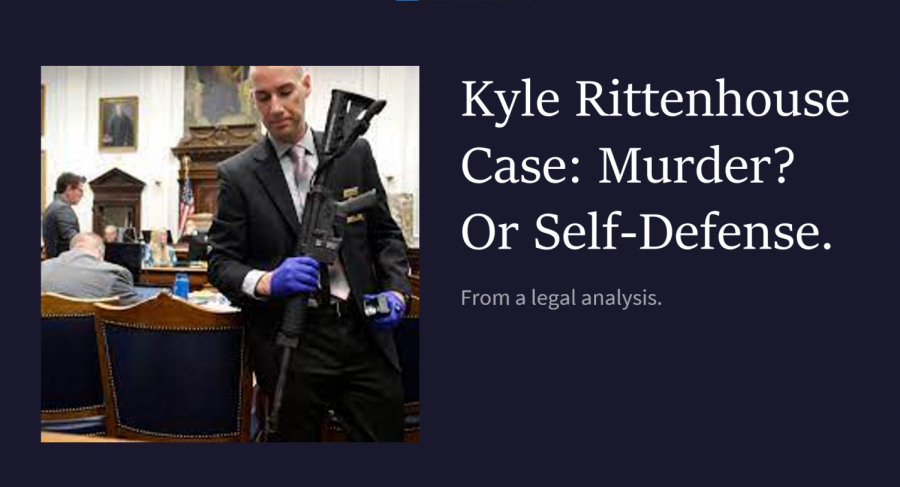Kyle Rittenhouse: Murder? or Self-Defense.
EDITOR’S NOTE: Stories that I write which pertain to law should NOT be used and considered as legal advice. I am not an attorney, nor can I give you legal advice. I am not licensed to practice law in my jurisdiction. Everything in this article is for informational and educational purposes only. All non-licensed material is used for fair use criticism and educational purposes.
After a two-week trial, a Wisconsin jury acquitted Kyle Rittenhouse of shooting three people, killing two during a racial justice protest in Kenosha. At the time, Rittenhouse was a 17-year-old from Illinois who traveled to Kenosha after a far-right social media accounts called on people to protect the city from riots. Rittenhouse acted in the midst of a chaotic protest where many people were legally carrying firearms. A bystander video shows the men that Rittenhouse shot were in confrontations with him. Rittenhouse has been found not guilty in all six charges, arising from his conduct that day.
What Happened at The Rittenhouse Trial?
There’s no dispute that Rittenhouse killed two men, and injured the third. But that doesn’t mean that the case has come to an end. From this point, this is only the beginning. Many people thought that when Rittenhouse admitted on the stand that he intentionally used deadly force on Rosenbaum and Huber, that was a tactical blunder. But intentional use of deadly force is what’s privileged when you meet the requirements of self-defense. From a legal analysis, this case hinged on whether self-defense was applied. This case turned on the distinction of both self-defense laws, and criminal procedure. It is not surprising that both sides had little knowledge of what laws actually applied.
Self-Defense Laws in Wisconsin.
Self-defense laws vary by state in the U.S. In Wisconsin, self-defense, like many other states is an informative defense. The defendant has to produce some evidence. They must put forth some evidence from which a jury can find that self-defense applied. This is referred to as the Burden of Production. But then, once the defense has been made this relatively minimal burden, the Burden of Proof returns to the prosecution, which must disprove self-defense beyond a reasonable doubt which is the highest standard in all law. Every state has a self-defense law that states the person who is not the aggressor is justified in using deadly force against an adversary when he or she reasonably believes that they are in imminent danger of death or serious bodily injury. As you may know, jurors aren’t attorneys. So they are given instructions that include all the laws they will need to decide a case. The attorneys and judge will debate jury instructions, which will be the only law that jurors receive in that particular case. It is supposed to accurately summarize the law that the jurors are applying. As you can imagine, the language of the jury instructions is extremely important. The Rittenhouse jury instructions summarize the self-defense requirements in Wisconsin as “the defendant believed that there was an actuator imminent unlawful interference with the defendant’s person; and the defendant believed that the amount of force the defendant believed that the amount of force the defendant used or threatened to use was necessary to prevent or terminate the interference; and the defendant’s beliefs were reasonable. The defendant may intentionally use force which is needed or likely to cause death or great bodily harm only if the defendant reasonably believed that the force used was necessary to prevent imminent death or great bodily harm to himself.”
In a situation like this, a reasonable belief doesn’t mean that the defendant’s actions were justifiable. One can have a reasonable belief, but still can be mistaken. Reasonableness is determined from the standpoint of the defendant in the situation at issue, not after the fact. Additionally, the law of self-defense becomes more complicated once it is applied to different homicides and manslaughter. This is because the mental state required is different for each offense. But this can be seen in the jury instructions in which the court modified general rules and definitions. This is likely done in order to apply each charge in this case.
The Duty to Retreat.
Wisconsin doesn’t have a standard Duty to Retreat. The Duty to Retreat is a legal requirement in some jurisdictions in which a threatened individual cannot harm another in self-defense. This also applies to lethal force. However, jurors can consider whether someone attempted to avoid danger, as they assess the self-defense claim. As of now, juries are still allowed to consider whether the defendant had the opportunity to retreat to determine whether or not it was necessary to use lethal force. Wisconsin does however have a Duty to Retreat when the aggressor provokes the attack. At common law, most jurisdictions have a Duty to Retreat before someone is allowed to engage in deadly force for the purpose of self-defense. The Duty to Retreat is now required in a minority of U.S. states.
The overtone of self-defense at issue is that of provocation. Someone who provokes an attack can not claim lawful self-defense. The Wisconsin law on provocation states, “A person who engages in the unlawful conduct of a type likely to provoke others to attack him or her and thereby does provoke an attack is not entitled to claim the privilege of self-defense against such attack, except when the attack which ensues is of a type causing the person engaging in the unlawful conduct to reasonably believes that he or she is in imminent danger of death, or great bodily harm. In such a case, the person engaging in the unlawful conduct is privileged to act in self-defense.” This law on provocation is an exception to self-defense. For example, someone engages in unlawful conduct likely to provoke others. This means that you cannot claim self-defense. Except that you can, if your provocation leads others to use effectively deadly force against you. The law also states that you can only use the deadly force that you’ve provoked if you exercised the Duty to Retreat.
The Exception of Provocation.
Many people believe that Rittenhouse provoked the attacks themselves, therefore he couldn’t use the privilege of self-defense. By brandishing a firearm, or placing himself in the situation, he provoked the attack. Judge Schroader granted defense motions to dismiss the two misdemeanor charges against Rittenhouse. Rittenhouse was charged with possession of a dangerous weapon as a minor, and breaking curfew. Arguably Wisconsin law has exceptions that allow minors to possess firearms as long as they’re not short-barreled. More importantly, however, provocation requires unlawful conduct of a type likely to provoke others. Even if the two charges were to stay, they might not be sufficient to provocation. The reason being is that Wisconsin is an open-carry state. This means that carrying a firearm isn’t unlawful, and possibly not the type likely to provoke others.
“Did The Jury Reach The Right Verdict?”
From a legal standpoint, the jury was correct to find that there was reasonable doubt that Rittenhouse did not use self-defense. However, it’s likely that the jury found Rittenhouse innocent or a “hero” according to some arguments. Assuming that the jury was correct in finding reasonable doubt, it is possible that the jury’s verdict accurately reflects Wisconsin’s laws. If the state of Wisconsin were to have a standard Duty to Retreat, then the case’s results would be different. If this were to occur in another state, the law could have hindered a different verdict. Some minds may disagree. The takeaway of an incident is that this occurred in a jurisdiction with general firearm laws. The prosecution had very high standards to meet, and the defendant put on a good defense. As for the decision, we’ll leave it to you.

My name is Diamond. I just graduated high school and now I'm producing content part-time online. My most popular profile is @BlindOS_22 on TikTok which...













